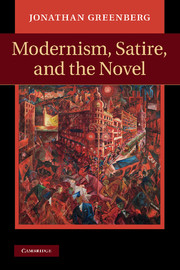Book contents
- Frontmatter
- Contents
- Illustration
- Preface
- Abbreviations
- Chapter 1 Satire and its discontents
- Chapter 2 Modernism's story of feeling
- Chapter 3 The rule of outrage: Evelyn Waugh's Vile Bodies
- Chapter 4 Laughter and fear in A Handful of Dust
- Chapter 5 Cold Comfort Farm and mental life
- Chapter 6 Nathanael West and the mystery of feeling
- Chapter 7 Nightwood and the ends of satire
- Chapter 8 Beckett's authoritarian personalities
- Notes
- Index
Chapter 6 - Nathanael West and the mystery of feeling
Published online by Cambridge University Press: 07 October 2011
- Frontmatter
- Contents
- Illustration
- Preface
- Abbreviations
- Chapter 1 Satire and its discontents
- Chapter 2 Modernism's story of feeling
- Chapter 3 The rule of outrage: Evelyn Waugh's Vile Bodies
- Chapter 4 Laughter and fear in A Handful of Dust
- Chapter 5 Cold Comfort Farm and mental life
- Chapter 6 Nathanael West and the mystery of feeling
- Chapter 7 Nightwood and the ends of satire
- Chapter 8 Beckett's authoritarian personalities
- Notes
- Index
Summary
Understanding the place of satire within modernism entails, I have been arguing, attention to the ways in which modern feeling can take on surprising new guises. Every bit as much as Waugh and Gibbons, Nathanael West explicitly thematizes problems of feeling throughout his writing. Often in his work, the mere experience of particular emotions, especially in response to scenes of suffering, becomes a source of conflict for characters and readers alike. As Justus Nieland has observed, West “regularly refuses to provide the affective codes that might give his reader a clue about how to feel.” Such conflict arises because even as West's fiction subjects sentimental expressions of feeling to intense satiric scrutiny, it is no less searching in its scrutiny of satire itself, and of the ironic or joking postures that accompany it. In fact, the artistic quests of virtually all West's protagonists can be seen very simply as efforts to resolve the tension between the claims of satire and those of sentiment. West's fiction at once manifests and resists a satiric impulse, and the push and pull of this ambivalence constitute the central dynamic of his work.
At the age of nineteen, writing in the Brown University literary magazine, West already discerns this conflict: “In reading Euripides, we find ourself ready to classify him at moments as a satirist and at other moments as a man of feeling. Of course he was both. Sometimes he seems like a religious man and again like a charlatan. Of course he was neither. He was a great playwright.” In this formulation, wry in its own tone if bland in its conclusions, satire negates feeling, and both pose risks for the writer: excessive feeling leads to religion and mysticism, while excessive satire leads to performance and charlatanry. In The Dream Life of Balso Snell, similarly, John Gilson remarks: “I always find it necessary to burlesque the mystery of feeling at its source; I must laugh at myself, and if the laugh is ‘bitter,’ I must laugh at the laugh. The ritual of feeling demands burlesque.” Feeling for Gilson is mere ritual, empty adherence to a prescribed norm; both sentimental feelings and the bitter negation of those feelings must be rejected. In contrast to this ever-more-ironic suppression of feeling stands “mystery,” a term that gestures at the unknowable and the authentic, and which, I will argue, is never wholly negated in West.
- Type
- Chapter
- Information
- Modernism, Satire and the Novel , pp. 115 - 137Publisher: Cambridge University PressPrint publication year: 2011



